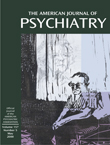Euphoric Mania and Rapid Transcranial Magnetic Stimulation
Ms. A was a 59-year-old woman with a diagnosis of bipolar I disorder. After her first and only depressive episode, which developed postpartum at age 35, she experienced at least four severe manic episodes. Eight weeks before hospital admission she developed euphoric mania despite lithium treatment. Lithium treatment was discontinued, and a trial with the antiepileptic drug sulthiame was initiated—unfortunately, with no effect after 3 weeks of treatment. Sulthiame treatment was tapered off, and monotherapy with rapid transcranial magnetic stimulation was begun. Right prefrontal stimulation was performed, as suggested by Grisaru et al. (1): 20 trains per session, a frequency of 20 Hz for 2 seconds per train, and an intertrain interval of 1 minute.Ms. A was given five consecutive sessions during weeks 1 and 2 and three sessions during weeks 3 and 4. Her range of motor threshold was 66%–76%. Her scores on the Bech-Rafaelsen Mania Scale (3) slowly but continuously fell (28 on day 0, 24 on day 7, 15 on day 14, 10 on day 21, and 8 on day 28). Her sleep disturbance and thought disorder seemed to respond particularly well to rapid transcranial magnetic stimulation. Ms. A was dismissed from the hospital ward. Prophylactic treatment with the third-generation, putative mood-stabilizing anticonvulsant topiramate (4) was initiated for Ms. A for obesity.
References
Information & Authors
Information
Published In
History
Authors
Metrics & Citations
Metrics
Citations
Export Citations
If you have the appropriate software installed, you can download article citation data to the citation manager of your choice. Simply select your manager software from the list below and click Download.
For more information or tips please see 'Downloading to a citation manager' in the Help menu.
There are no citations for this item
View Options
View options
PDF/ePub
View PDF/ePubGet Access
Login options
Already a subscriber? Access your subscription through your login credentials or your institution for full access to this article.
Personal login Institutional Login Open Athens loginNot a subscriber?
PsychiatryOnline subscription options offer access to the DSM-5-TR® library, books, journals, CME, and patient resources. This all-in-one virtual library provides psychiatrists and mental health professionals with key resources for diagnosis, treatment, research, and professional development.
Need more help? PsychiatryOnline Customer Service may be reached by emailing [email protected] or by calling 800-368-5777 (in the U.S.) or 703-907-7322 (outside the U.S.).

